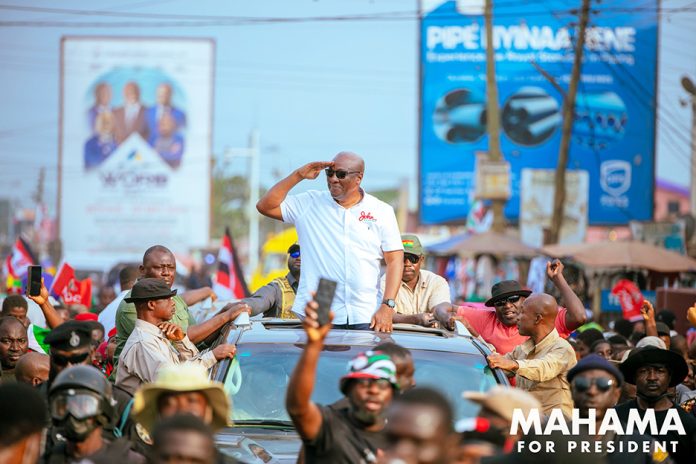The flagbearer of the National Democratic Congress (NDC), John Dramani Mahama, says his next government will ensure fiscal discipline at all levels, as part of his drive to reset and transform the country.
The fiscal policy, he noted, would be anchored on his 24-hour economy catchphrase, which has been the running theme of the largest opposition NDC, ahead of the December polls.
In the “Resetting Ghana” manifesto, which has been duly launched, Mr. John Mahama explained that a fiscal policy anchored on a 24-hour economy would strategically enhance productivity and maximise production.
This, he said, would create sustainable jobs and transform Ghana into an import substitution and export-led economy to reset the nation on the path of growth, through the export of goods and services.
Specific objectives
According to the details of the 24-hour economy, as contained in the manifesto, it would enhance revenue mobilisation, reduce government expenditure and cut down waste, as well as reduce public debt to sustainable levels.
It would also reduce consumption-related expenditures and increase capital investments to spur economic growth and job creation, reduce the fiscal deficit progressively in accordance with the Fiscal Responsibility Act.
Scaling up Revenue Mobilisation
Mr. Mahama proposed that the next NDC government would enhance revenue mobilisation and create an equitable and efficient tax system by broadening the tax base.
It would also review the extractive sector regime to enhance Ghana’s stake in the country’s natural resources and the tax exemption regime to promote transparency, economic growth, technology transfer and job creation.
Additionally, there would be a review of the Public Financial Management Act, 2016 (Act 921) and the Public Procurement Act, 2016 (Act 914) to plug leakages and reduce waste and corruption.
Others include the review and rationalisation of port fees to enhance trade competitiveness and maximise revenue and resume the restructuring of the Ghana Revenue Authority (GRA) initiated by the previous NDC government to improve tax administration and compliance.
Operationalisation of the Independent Tax Appeals Board (ITAB) enactment of a Natural Resources Revenue Management Act (NRMA) to increase revenue from Ghana’s mineral resources, including green minerals.
Further, the party intends to review the Petroleum Revenue Management Act, 2011 (Act 815) to maximise petroleum revenue for development, harmonise and standardise the tax regime to ensure equity in tax administration for effective mobilisation.
According to the manifesto, the next NDC government would diversify funding options for development, by introducing Diaspora Bonds and pursue membership of the Islamic Development Bank to broaden opportunities for development financing.
The party would also implement the Public-Private Partnership Act, 2020 (Act 1039) for infrastructure financing and also revive fiscal decentralisation for local development.
Prudent Expenditure Management
The NDC disclosed in the manifesto that its next government would ensure fiscal discipline by rationalising government spending to promote efficiency, economic growth and job creation.
To achieve this, the party, he said, would prioritise investments in the productive sectors of the economy, digitalise and harmonise the government’s fiscal management systems for efficient expenditure management.
Enforce compliance with the Public Procurement Law to stop the abuse of sole-sourcing and other breaches and restore the contract database and management system created by the NDC in 2010 to ensure accountability, transparency and efficient administration of government contracts.
Complete the Treasury Single Account Project started by the previous NDC government to ensure efficient management of public funds and revamp the Ghana Infrastructure and Investment Fund (GIIF) to undertake well-targeted and self-financing projects.
It further intended to revise the Earmarked Funds Capping and Realignment Act, 2017 to free statutory funds (such as the GETFUND, NHIL, Road Fund and Student Loan Trust Fund ‘SLTF’) for their mandated objectives.
According to Mr. Mahama, his government would reduce expenditure by running a lean government that eschews profligacy and opulence.
He would improve disbursements into the District Assemblies Common Fund (DACF) for local development and revive fiscal decentralization for local development.
It would also determine a criterion for the grant of tax exemptions based on a measurable cost-benefit approach and a rigorous monitoring mechanism to ensure the state gains.
As a benchmark for the devolution, fiscal discipline basically is government’s ability to maintain a consistent macroeconomic stability and sustained economic growth and monetary operation and fiscal condition.
To achieve this, governments would be required to maintain fiscal positions by avoiding excessive borrowing and debt accumulation to ensure sustainable debt levels.
It helps to control inflation and maintain macroeconomic stability, enhance credibility and create favourable environment for businesses to thrive.








